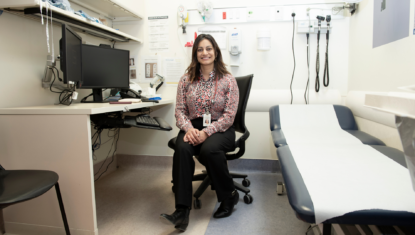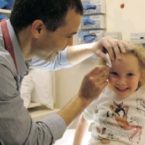By its nature, emergency department (ED) research encompasses a diverse research agenda echoing the wide variety of clinical presentations that are treated in there. Some of the research at the CHEO ED includes whether or not a child requires a head CT following minor head injury; outcomes of treating infants with bronchiolitis with epinephrine and steroids; improved efficiencies of nurse-initiation of steroids for asthma; and how to better manage common pediatric presentations in the ED (pharyngitis, asthma, croup, migraine, behavioural problems, wounds, minor extremity injuries, and prehospital care) and how to better translate this knowledge.
Related News
Research Projects
-
Improving transitions in care for children and youth with mental health concerns: implementation and evaluation of an emergency department mental health clinical pathway
31/03/2025
The emergency department (ED) is a common access point for children and youth seeking mental health (MH) and addiction care [1]. Pediatric MH visits to EDs have significantly increased since 2009 in Ontario, Canada [2,3,4]. Over 50% of children and youth use the ED as the first contact for MH concerns without previously seeking outpatient care, with many patients returning to the ED to seek additional care [5]. Although families increasingly rely on EDs for MH care, these settings are often unprepared to manage children and youth with urgent and emergent MH concerns [5]. EDs lack standardized screening tools, clinical resources, and clinicians trained to confidently manage pediatric MH patients [5,6,7]. Adding to this problem is the complex and fragmented MH system in Canada, which creates difficulty in providing a coordinated transition for patients between the ED and community services. The lack of streamlined referral processes to MH resources in the community results in ED clinicians discharging their patients without appropriate recommendations for follow-up care based on their needs [8]. Each of Ontario’s 33 geographical service areas have lead agencies that are responsible for ensuring that core child and youth MH services are available to their respective communities. Lead agencies can directly deliver these core services or work in partnership with other core service providers in their communities to develop and strengthen pathways to care. Pathways between lead MH agencies and EDs have been established in Ontario and are evolving, but many gaps in care remain.
-
Pediatric emergency department physicians’ perceptions of virtual mental health assessments for urgent needs
07/02/2023
While many physicians agreed that there is a potential benefit of the ED virtual care platform for urgent mental health assessments, time constraints and lack of confidence in providing satisfactory virtual mental health care with minimal mental health support limited its acceptability. These findings can inform the future implementation of mental health services using an innovative virtual ED platform.
-
Epinephrine MDI for Pediatric Croup. Academic Emergency Medicine
24/10/2022
The QA network formed a committee of Canadian experts in pediatric emergency medicine, pharmacology, critical care, and aerosol delivery who, through consensus, approved an assessment and dosing algorithm that incorporated relevant evidence identified through literature review. Using a standardized bedside data collection form, the algorithm recommended administering five puffs (125 μg/puff) via MDI with a valved holding chamber (VHC), with assessment recommended 10 min later for clinical improvement using the Westley Croup Score (WCS)4 and for adverse effects by documenting heart rate (HR), cardiac rhythm, and presence of tremor or agitation.
-
Early Analgesic Administration and Headache Presence 7-days Post-Concussion in Children
15/09/2022
-
Is early activity resumption after paediatric concussion safe and does it reduce symptom burden at 2 weeks post injury? The Pediatric Concussion Assessment of Rest and Exertion (PedCARE) multicentre randomised clinical trial.
15/03/2022
PA is a promising concussion treatment. Post-concussion symptoms at 2weeks did not differ significantly between children/ youth with acute concussion randomised to initiate PA at 72 hours post injury versus those instructed to rest-until-asymptomatic.
-
The Toddler’s Fracture
01/01/2022
Although a stable fracture with an excellent prognosis, opportunities exist to improve toddler's fractures diagnosis and treatment protocols, to optimize clinical management.
-
Skin Testing for Penicillin Allergy: a Review of the Literature
18/03/2021
This review provides support for risk stratification assessment of reported penicillin allergy to optimize antibiotic use and prevent emergence of antimicrobial resistance.
-
Effect of Nebulized Magnesium vs Placebo Added to Albuterol on Hospitalization Among Children With Refractory Acute Asthma Treated in the Emergency Department: A Randomized Clinical Trial
24/11/2020
Among children with refractory acute asthma in the emergency department, nebulized magnesium with albuterol, compared with placebo with albuterol, did not significantly decrease the hospitalization rate for asthma within 24 hours. The findings do not support use of nebulized magnesium with albuterol among children with refractory acute asthma.
-
Solid organ donation from the emergency department – missed donor opportunities
22/09/2020
The ED is a source of missed organ donors. All potential donors were missed due to referral after withdrawal of life-sustaining therapy. ED physicians should consider the possibility of solid organ donation prior to the withdrawal of life-sustaining therapy.
-
Symptom Burden, School Function, and Physical Activity One-Year Following Pediatric Concussion
25/08/2020
Most youth are symptom-free and fully recovered one year following concussion. Some children with repeat concussion have worse outcomes and have delays in returning to normal school routines and sport.
-
Whole-body vibration in neonatal transport: a review of current knowledge and future research challenges
01/07/2020
This review intends to highlight what is known about vibration as a physical stressor in neonates and areas for further research; with the goal to making recommendations for minimizing these stressors during transport.
-
Characteristics of Vomiting as a Predictor of Intracranial Injury in Pediatric Minor Head Injury
09/06/2020
Recurrent vomiting (≥ four episodes) was a significant risk factor for intracranial injury in children after minor head injury.
-
The HEADS-ED: Evaluating the Clinical Use of a Brief, Action-Oriented, Pediatric Mental Health Screening Tool
01/06/2020
Results support the HEADS-ED's use by PED physicians to help guide the assessment and referral process and for discussing the clinical needs of patients among health care providers using a common action-oriented language.
-
Hands-On Workshops Improve Emergency Department Physicians’ Self-Reported Understanding of Pediatric Hand Injuries
18/05/2020
Knowledge sharing between specialists and generalists through combined didactic and hands-on workshops is an effective and well-received method of refining physician knowledge and increasing confidence in treating subspecialty-specific clinical presentations.
-
Adverse events in the paediatric emergency department: a prospective cohort study
29/04/2020
Conclusion One in 40 children suffered adverse events related to ED care. A high proportion of events were preventable. Management and diagnostic issues warrant further study.
-
Exploring Opportunities to improve patient safety in our Emergency Departments
29/04/2020
The study explored opportunities to improve patient safety by providing evidence of where to focus efforts in a resource-restricted environment.
-
Predictors of future acute asthma visits among children receiving guideline recommended emergency department discharge management
23/04/2020
This retrospective cohort study that shows that even if children receive an asthma action plan or prescription for inhaled steroids after a tertiary care ED asthma visit, youth with a peanut allergy, with high severity symptoms at presentation, and a prior asthma diagnosis are most likely to return to the ED.
-
Surgical and nonsurgical pediatric hand fractures: a cohort study
01/03/2020
A retrospective cohort of consecutive pediatric patients referred with hand fractures to the Alberta Children’s Hospital (ACH) hand clinic over this 2-year period was also identified; this cohort was, therefore, a subset of all pediatric hand fractures in the Calgary zone. The ACH is a tertiary pediatric center that serves the city of Calgary as well as southern Alberta and cares for over 90,000 children per year. Five pediatric plastic surgeons, all hand surgeons, manage the pediatric hand fracture referrals to the center. Patients were identified using the Clinibase Regional Scheduler software (Logibec, Montreal, QC). The medical records (both electronic and paper) of any patient with a diagnosis of a hand injury were reviewed and those with a radiographically confirmed hand fracture were included in the present study. Patients were excluded if they had a soft tissue injury without an accompanying hand fracture or had incomplete chart information. Complete amputations were excluded. Partial amputations were included and recorded as open fractures.
-
The Canadian anaphylaxis action plan for kids: development and validation
02/01/2020
The Kids’ CAP is a useful educational tool to improve patient’s comprehension of anaphylaxis management.
-
Health outcomes associated with emergency department visits by adolescents for self-harm: a propensity-matched cohort study
06/11/2019
Adolescents with emergency department visits for self-harm have higher rates of mortality, suicide and recurrent self-harm, as well as higher health care costs, than matched controls.
-
A regional massive hemorrhage protocol developed through a modified Delphi technique
03/09/2019
This MHP template will provide the basis for the design of an MHP toolkit, including specific recommendations for pediatric and obstetrical patients, and for hospitals with limited availability of blood components or means to achieve definitive hemorrhage control. We believe that harmonization of MHPs in our region will simplify training, increase uptake of evidence-based interventions, enhance communication, improve patient comfort and safety, and, ultimately, improve patient outcomes.
-
Paediatric acute lymphadenitis: Emergency department management and clinical course
01/09/2019
The vast majority of children with acute lymphadenitis were managed with outpatient oral antibiotics and did not require return emergency department visits or surgical drainage.
-
Changing Rates of Self-Harm and Mental Disorders by Sex in Youths Presenting to Ontario Emergency Departments: Repeated Cross-Sectional Study
01/06/2019
Rates of adolescents with self-harm and mental health ED visits have increased since 2009, with greater increases among females. Research is required on the determinants of adolescents’ self-harm and mental health ED visits and how they can be addressed in that setting.
-
Emergency department visit count: a practical tool to predict asthma hospitalization in children
01/06/2019
We identified 2669 patients with 3300 asthma ED visits. ED visit count was an independent predictor of future hospitalization risk (p < 0.001), demonstrating a dose-dependent response.
-
Paediatric health care access in community health centres is associated with survival for critically ill children who undergo inter-facility transport: A province-wide observational study
04/04/2019
We found that in Ontario, children undergoing inter-facility transport to PICUs are increasing in number, consume significant acute care resources, and have a high PICU mortality.
-
Target oxygen saturation and development of pulmonary hypertension and increased pulmonary vascular resistance in preterm infants
01/01/2019
Higher targeted oxygen saturation was associated with reduced risk of PH or elevated PVR in extremely preterm infants compared to lower oxygen saturation target.
-
No association between metoclopramide treatment in ED and reduced risk of post-concussion headache
04/12/2018
Further research is necessary to determine which pharmacotherapies may be effective for acute and persistent post-concussive headache.
-
Self-Inflicted Injury-Canadian Hospitals Injury Reporting and Prevention Program (CHIRPP-SI): a new surveillance tool for detecting self-inflicted injury events in emergency departments
11/10/2018
To assess the performance of the Canadian Hospitals Injury Reporting and Prevention Program’s newly developed self-harm surveillance tool (CHIRPP-SI) designed to improve emergency department (ED) hospital surveillance of youth self-inflicted injury (SI).
-
Validation and refinement of a clinical decision rule for the use of computed tomography in children with minor head injury in the emergency department
01/07/2018
We sought to prospectively validate the accuracy and potential for refinement of a previously derived decision rule, Canadian Assessment of Tomography for Childhood Head injury (CATCH), to guide CT use in children with minor head injury.
-
Education in the Waiting Room: Description of a Pediatric Emergency Department Educational Initiative
01/10/2017
This was a prospective observational study at a Canadian tertiary-care pediatric emergency department (ED) with an annual census of 68,000 visits.
-
A nurse-initiated jaundice management protocol improves quality of care in the paediatric emergency department
01/08/2017
Implementation of a PED neonatal jaundice management protocol was associated with improved timeliness and standardization of care for this common and important condition.
-
A Randomized Controlled Trial Of Corticosteroids In Pediatric Septic Shock: A Pilot Feasibility Study
01/06/2017
This study suggests that a large RCT on early use of corticosteroids in pediatric septic shock is potentially feasible. However, the frequent use of empiric corticosteroids in otherwise eligible patients remains a significant challenge.
-
Predictors of Repeated Visits to a Pediatric Emergency Department Crisis Intervention Program
30/08/2016
Repeat visits account for a large portion of all MH presentations to the PED. Furthermore, several patient characteristics are significant predictors of repeat PED use and of repeating use sooner and more frequently.
-
A qualitative exploration of which resident skills parents in pediatric emergency departments can assess
26/04/2016
This study demystifies how parents can become involved in the assessment of residents’ NTS. The findings will inform the development of assessment strategies and could be used to develop assessment instruments that enable parents to become actively involved in the assessment of residents in pediatric EDs.
-
Novel WDR45 Mutation and Pathognomonic BPAN Imaging in a Young Female With Mild Cognitive Delay
04/09/2015
Pregnancy and birth history were unremarkable. Gross and fine motor developmental milestones were achieved at appropriate times during childhood; however, her mother reported a long-standing history of expressive and receptive language difficulties requiring speech language therapy until grade 8.
-
Epidemiology and clinical predictors of biphasic reactions in children with anaphylaxis
17/06/2015
Biphasic reactions seem to be associated with the severity of the initial anaphylactic reactions. We identified clinical predictors that could ultimately be used to identify patients who would benefit from prolonged ED monitoring and enable better utilization of ED resources.
-
Lactation Support and Breastfeeding Duration in Jaundiced Infants: A Randomized Controlled Trial
05/03/2015
The decision to breastfeed is multifactorial and hospital-based lactation support may be only a small piece of the puzzle in hospitalized jaundiced infants. Further studies may be needed to fully elucidate the impact of an in-hospital lactation support program on successful breastfeeding for these infants.
-
Validity, Reliability, and Responsiveness of a New Measure of Health-Related Quality of Life in Children with Immune Thrombocytopenic Purpura: The Kids’ ITP Tools
01/05/2007
The initial phase involved cognitive debriefing of 12 families, on the basis of which the measure was modified and then named Kids’ ITP Tools (KIT).
-
Complex care for kids Ontario: protocol for a mixed-methods randomised controlled trial of a population-level care coordination initiative for children with medical complexity
Our primary objective is to evaluate the CCKO intervention using a randomised waitlist control design. The waitlist approach involves rolling out an intervention over time, whereby all participants are randomised into two groups (A and B) to receive the intervention at different time points determined at random.
Researchers
-
Fuad Alnaji
Investigator, CHEO Research Institute
-
Waleed Alqurashi
Scientist, CHEO Research Institute
-
Nick Barrowman
Associate Scientist, CHEO Research Institute
-
Melanie Bechard
Investigator, CHEO Research Institute
-
Nadya Ben Fadel
Investigator, CHEO Research Institute
-
Maala Bhatt
Scientist, CHEO Research Institute
-
Vanessa Bohn
Investigator, CHEO Research Institute
-
Natalie Bresee
Investigator, CHEO Research Institute
-
Mario Cappelli
Investigator, CHEO Research Institute
-
Sasha Carsen
Scientist, CHEO Research Institute
-
Kevin Cheung
Investigator, CHEO Research Institute
-
Paula Cloutier
Investigator, CHEO Research Institute
-
Sonny Dhanani
Investigator, CHEO Research Institute
-
William Gardner
Senior Scientist, CHEO Research Institute
-
Jeff Gilchrist
Associate Scientist, CHEO Research Institute
-
Stuart Harman
Investigator, CHEO Research Institute
-
Sherri Katz
Senior Scientist, CHEO Research Institute
-
Allison Kennedy
Investigator, CHEO Research Institute
-
Ceilidh Kinlin
Investigator, CHEO Research Institute
-
Robert Klaassen
Scientist, CHEO Research Institute
-
Andrée-Anne Ledoux
Scientist CHEO Research Institute
-
Brigitte Lemyre
Investigator, CHEO Research Institute
-
Private: Michelle Long
Investigator, CHEO Research Institute
-
Nathalie Major
Investigator, CHEO Research Institute
-
Dayre McNally
Senior Scientist, CHEO Research Institute
-
Kusum Menon
Senior Scientist, CHEO Research Institute
-
Kimmo Murto
Investigator, CHEO Research Institute
-
Martin Osmond
Emeritus Senior Scientist, CHEO Research Institute
-
Amy Plint
Senior Scientist, CHEO Research Institute
-
Christine Polihronis
Investigator, CHEO Research Institute
-
Dhenuka Radhakrishnan
Scientist, CHEO Research Institute
-
Stephanie Redpath
Investigator, CHEO Research Institute
-
Sarah Reid
Investigator, CHEO Research Institute
-
Nicole Sheridan
Investigator, CHEO Research Institute
-
Kevin Smit
Investigator, CHEO Research Institute
-
Wendy Spettigue
Investigator, CHEO Research Institute
-
Bernard Thébaud
Senior Scientist, CHEO Research Institute
-
Mark S. Tremblay
Senior Scientist, CHEO Research Institute
-
Sandy Tse
Investigator, CHEO Research Institute
-
Roger Zemek
Senior Scientist, CHEO Research Institute










































